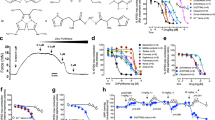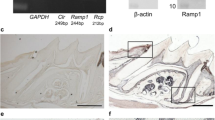Abstract
A novel peptide, calcitonin gene-related peptide (CGRP), has been predicted to result from alternative processing of the primary RNA transcript of the calcitonin gene in the rat1,2. Several lines of evidence suggest that CGRP is a transmitter in the central and peripheral nervous system2–4. Human CGRP has been isolated and characterized5, and shown to have potent effects on the heart6. The observations presented here indicate that human and rat CGRP also have potent effects on blood vessels. Intradermal injection of CGRP in femtomole doses induces microvascular dilatation resulting in increased blood flow, which we have detected in the rabbit by using a 133Xe clearance technique7,8. In human skin, CGRP induces persistent local reddening. Microscopic observation of the hamster cheek pouch9 in vivo revealed that topical application of CGRP induces dilatation of arterioles. Furthermore, CGRP relaxes strips of rat aorta in vitro by an endothelial cell-dependent mechanism. Therefore, we suggest that local extravascular release of CGRP may be involved in the physiological control of blood flow and that circulating CGRP may contribute to hyperaemia in certain pathological conditions.
This is a preview of subscription content, access via your institution
Access options
Subscribe to this journal
Receive 51 print issues and online access
$199.00 per year
only $3.90 per issue
Buy this article
- Purchase on Springer Link
- Instant access to full article PDF
Prices may be subject to local taxes which are calculated during checkout
Similar content being viewed by others
References
Amara, S. G., Jonas, V., Rosenfeld, M. G., Ong, E. S. & Evans, R. M. Nature 298, 240–244 (1982).
Rosenfeld, M. G. et al. Nature 304, 129–135 (1983).
Fisher, L. A. et al. Nature 305, 534–536 (1983).
Mason, R. T. et al. Nature 308, 653–655 (1984).
Morris, H. R. et al. Nature 308, 746–748 (1984).
Etienne, T. et al. J. Physiol., Lond. 351, 48P (1984).
Williams, T. J. J. Physiol., Lond. 254, 4–5P (1976).
Williams, T. J. Br. J. Pharmac. 65, 517–524 (1979).
Duling, B. R. Microvasc. Res. 5, 423–429 (1973).
Hillyard, C. J. et al. Lancet i, 846–848 (1983).
Williams, T. J. & Peck, M. J. Nature 270, 530–532 (1977).
Williams, T. J. Br. J. Pharmac. 77, 505–509 (1982).
Furchgott, R. F. & Zawadzki, J. V. Nature 288, 373–376 (1980).
Solomon, L. M., Juhlin, L. & Kirschenbaum, M. B. J. invest. Derm. 51, 280–282 (1968).
Cohen, S. L., MacIntyre, I., Grahame-Smith, D. & Walker, J. G. Lancet II, 1172–1174 ( 1973).
Jancso, G., Kiraly, E. & Jancso-Gabor, A. Nature 270, 741–743 (1977).
Lembeck, F. & Holzer, P. Naunyn-Schmiedebergs Archs Pharmak. 310, 175–183 (1979).
Author information
Authors and Affiliations
Rights and permissions
About this article
Cite this article
Brain, S., Williams, T., Tippins, J. et al. Calcitonin gene-related peptide is a potent vasodilator. Nature 313, 54–56 (1985). https://doi.org/10.1038/313054a0
Received:
Accepted:
Issue Date:
DOI: https://doi.org/10.1038/313054a0
This article is cited by
-
Calcitonin gene-related peptide regulates periodontal tissue regeneration
Scientific Reports (2024)
-
Mode and site of action of therapies targeting CGRP signaling
The Journal of Headache and Pain (2023)
-
Capsaicin, The Vanilloid Receptor TRPV1 Agonist in Neuroprotection: Mechanisms Involved and Significance
Neurochemical Research (2023)
-
The ratio of alpha-calcitonin gene-related peptide to substance P is associated with the transition of bone metabolic states during aging and healing
Journal of Molecular Histology (2023)
-
A Brief Review of Gepants
Current Pain and Headache Reports (2023)
Comments
By submitting a comment you agree to abide by our Terms and Community Guidelines. If you find something abusive or that does not comply with our terms or guidelines please flag it as inappropriate.



